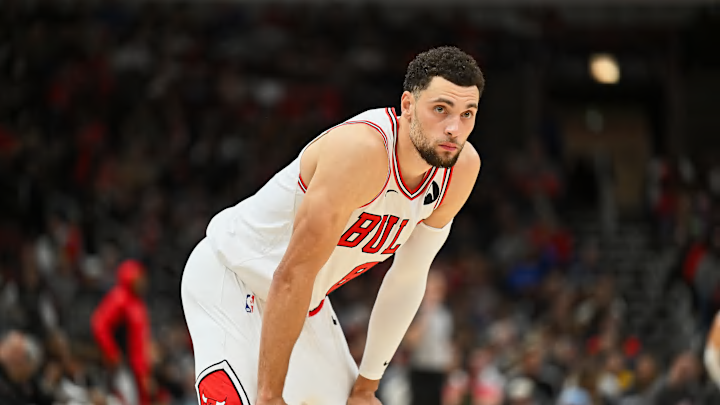It's been a while now since trade rumors centered around Zach LaVine first surfaced and started to feel like a real possibility. From the first look, it may seem that trading away LaVine would open the door for the Chicago Bulls to tank. Genuine All-Star talent is never easy to replace, but would losing LaVine really have that much of a negative impact on the Bulls if Chicago decides to move him elsewhere via trade?
"The Ewing Theory" is a term that was popularized by Bill Simmons in the early 00's. The definition of the theory is pretty simple and has two key components. The Ewing Theory applies to any star player in a professional sport when both of these criteria are met:
- A star athlete receives an inordinate amount of media attention and fan interest, and yet his teams never win anything substantial with him (other than maybe some early-round playoff series).
- That same athlete leaves his team (either by injury, trade, graduation, free agency, or retirement) -- and both the media and fans immediately write off the team for the following season.
Does Zach LaVine fit that definition? It certainly seems possible.
The biggest critique held against Zach is usually his lack of team success throughout his career. LaVine has only reached the postseason once in his nine-year career. Sure, it's not his fault he was drafted to the rebuilding Timberwolves and then traded to a dysfunctional Bulls team. But one playoff appearance? Early in his career, Zach was playing with Andrew Wiggins, Karl Anthony-Towns, and Ricky Rubio. In Chicago, he had Lauri Markkanen as his running mate. Currently, he's playing with DeMar DeRozan and Nikola Vucevic. That's five All-Star caliber players in total; it's not like LaVine hasn't had help getting to the playoffs, even as a low seed.
LaVine is considered to be one of the better-scoring two-guards in the league, and for good reason. Zach is a phenomenal athlete, has a sweet shooting stroke from long-range, and can get to the basket seemingly at will. Despite his phenomenal natural talent, he has repeatedly failed to make his teammates around him better. LaVine needs the ball to be effective and often holds onto the ball for far too long, stagnating the offense as a whole and reducing Chicago's effectiveness.
Bill Simmons' Ewing Theory offers an interesting take on how the Bulls may actually become a better team overnight by trading away Zach LaVine.
As the second or third option on offense for a contender, LaVine could excel in that role. As the leading man for the Bulls, however, far too many possessions are spent with LaVine dribbling the air out of the ball while his four teammates stand around as spectators to the game rather than active participants.
In all fairness, the Bulls are not constructed to best suit LaVine's talent. Chicago's roster is jam-packed with scorers, but no creators to facilitate good looks for the offensive weapons. That's why the Bulls rank dead last in assists per game, highlighting what was already a glaring weakness that this team failed to address over the summer. Put LaVine in a system, where he doesn't have to be the main creator and can be the second or third recipient on offense and you may get a completely different result.
By trading LaVine, Chicago would open more possibilities for Patrick Williams. Coby White could be more of himself and concentrate more on scoring. Perhaps the Bulls could get a competent point guard out of a trade, somebody who can actually run plays and get the ball to the guys in the right spots. If that happens, they could become quite an interesting team.
It would also give more playing time for Alex Caruso, who has been playing the best basketball of his career. Prior to the game against Toronto, he had scored 10+ points in seven straight games while maintaining his All-Defensive Team effort on the other end.
If LaVine gets traded, it would improve the Bulls' defense and allow them to move the ball around more freely. Even though Zach is averaging 23.3 points per game, I think that Chicago would be able to fill that void. They have more than enough options offensively to pick up the slack.
Now, I'm not claiming that trading LaVine away would help the Bulls kickstart a playoff push as soon as this season. Still, I believe a LaVine trade could actually benefit Chicago sooner than expected. As we saw in New York, the Knicks carried on to qualify for the NBA Finals in 1999 without their star player Patrick Ewing. Without Patrick Ewing, New York have made an NBA Finals in 1999.
Not only could the Bulls stand to benefit by moving on from Zach, but a change of scenery would also be best for LaVine as well at this point. His talents would be much better suited to a team that has a legitimate chance to advance deeper into the playoffs. If this trade does eventually happen, hopefully Zach LaVine will finally be able to prove to the world that he is a winning basketball player. It's become clear to see that he's never going to have that moment on the Chicago Bulls.
